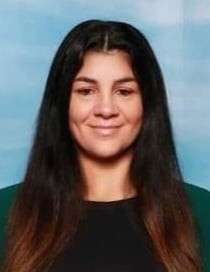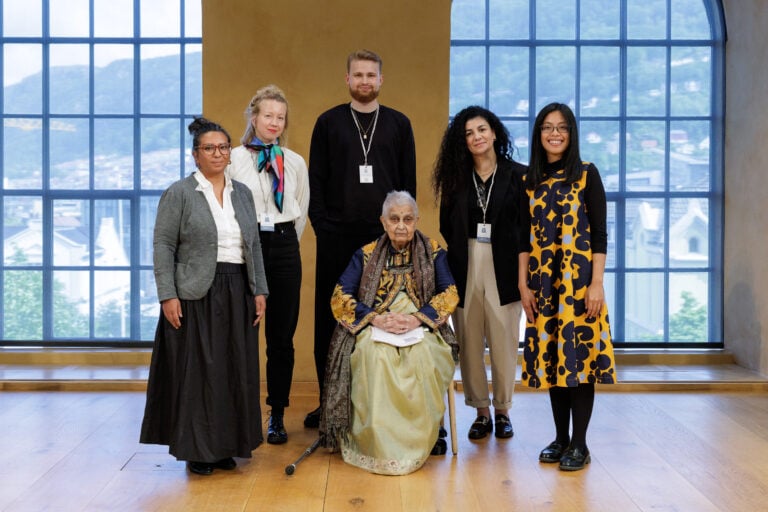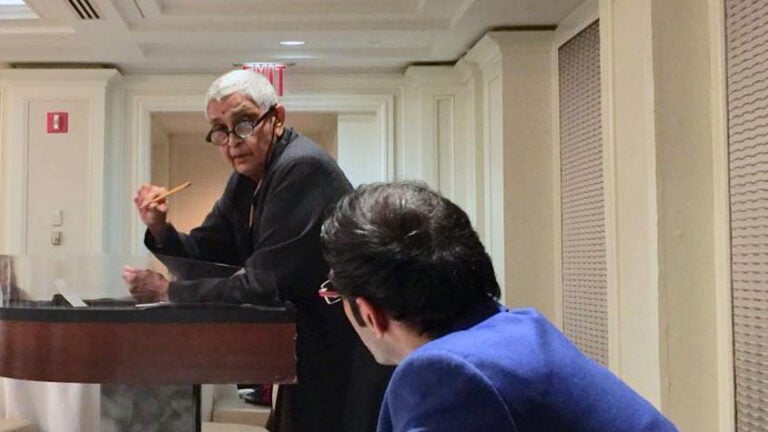Telma Velez’ presentation from the Holberg Masterclass with Gayatri Chakravorty Spivak on ‘The Practice of Learning’.
All disciplines produce knowledge and the students learn to know. The humanities – literature and philosophy – teach the practice of learning. In knowing, you know an object.
Introduction
On 4 June 2025, Five PhD candidates in the Nordic countries were invited to participate in a Masterclass with Holberg Laureate Gayatri Chakravorty Spivak on ‘The Practice of Learning’. Each of the participants gave a short presentation on the topic based on their research. The following text is a transcript from the presentation Telma Velez gave at the event.
The Ethics of Learning: Humanities as a Way of Knowing in the Study of Violence Against Migrant Women Working in Academia
My research explores the often-overlooked experiences of violence encountered by migrant women employed in academic institutions. It builds on my earlier involvement in a post-#MeToo project that investigated both intimate partner violence and employment-based violence among migrant women in Iceland. During that project, I conducted in-depth interviews with women from diverse cultural and occupational backgrounds. Over time, a pattern began to emerge among a specific subgroup: migrant women working within academia. These encounters were not only intellectually formative but also personally transformative, ultimately prompting me to focus my doctoral research on these layered and intersectional experiences of harm.
At the heart of this inquiry lies a commitment to understanding how systemic and symbolic violence are normalized in academic environments, and how such violence intersects with immigration status, cultural identity, and the politics of belonging. Drawing on critical theory, intersectionality, and trauma-informed methodologies, I examine not only the forms of harm enacted upon migrant bodies and minds, but also how these harms are legitimized or rendered invisible through institutional language, norms, and policy frameworks.
My research critically engages with the academic space—a setting that, at its best, aspires to foster knowledge, critical inquiry, and social progress. Yet for many migrant scholars, researchers, and professionals, it can also function as a site of subtle and persistent harm, shaped by racialized, gendered, and colonial power dynamics. This violence does not always take the form of overt aggression; it often manifests through institutional silence, exclusion from decision-making, precarious employment, epistemic invalidation, and the accumulation of microaggressions which erode an individual’s physical and psychological well-being over time.
Yet, the question remains: what kind of knowledge am I producing, can I be a piece mouth for these women? And will my voice be heard? The ethics of learning, as shaped by the humanities, is not just an abstract principle; it is deeply intertwined with the structures of power that govern whose voices are heard, whose experiences are legitimized, and whose realities are rendered invisible.
To study violence is to engage with narratives of suffering, exclusion, and endurance. The ethical researcher—like the reader of literature or philosophy— must resist the urge to impose easy interpretations or allow hearsay of predefined ideas to take over. While academia often values objectivity, detachment, and classification, the ethics of learning as articulated by the humanities calls for something different: the necessity of restraint, of attentive listening, and of suspending judgment long enough to encounter the lived realities of others.
When studying migrant experiences, it is tempting to structure research around predefined frameworks—legal definitions of violence, institutional policies, statistical trends. But what of the silences? What of the stories that do not fit neatly into categories? Humanities remind us that learning is not merely about knowing an object but about allowing oneself to be displaced into another’s reality, as it used to happen when I was a young girl sitting at the front door of my family home, reading a Princess Diary book, while being warmed by the sun. Life was simple back then.
If literature and philosophy demand that we step outside of ourselves to inhabit another’s world, so too must research on violence and marginalization. The act of learning—when done ethically—is not just an intellectual pursuit, but a moral act. It requires researchers to navigate a delicate balance: How do we engage with stories of harm without appropriating them? How do we give voice without speaking over?
John Rawls (1999) concept of the “veil of ignorance” asks us to imagine justice from a standpoint of neutrality. But can true neutrality exist when studying violence? The humanities teach us that rather than striving for an impossible objectivity, we must cultivate an awareness of our own positionality. Ethical research does not seek to erase the researcher, but to acknowledge the inevitable ways in which our own biases, histories, and desires shape our interpretations. In that sense, the stories I encounter are not separate from mine. I carry them not as data, but as mirrors. Their vulnerability speaks to mine, and their struggle with belonging often echoes my own.
In reading literature, we are often drawn toward resolution—a satisfying conclusion, a coherent narrative, a clear antagonist. In research, the same temptation exists: the desire for clarity, for a structured argument, for a conclusion that neatly encapsulates the problem. But the ethics of learning demands something different: a willingness to sit with uncertainty, to resist closure, to acknowledge that knowledge itself is fragmented and evolving.
Studying violence against migrant women means engaging with stories of systemic exclusion, of institutional silence, of harm that does not always leave visible scars. It is not enough to simply document these experiences; the ethical responsibility lies in how I interpret them, how I represent them, how I allow them to challenge the very structures of academia that shape my research.
The humanities do not simply provide us with knowledge; they teach us how to know—ethically, attentively, with humility to be changed by what we learn. In my research, I see this lesson repeatedly: the importance of listening without immediate interpretation, the necessity of displacement into perspectives that challenge my own, and the responsibility to resist the simplification of complex realities. To study violence against migrant women working in academia is to confront power, silence, and resistance. It is to engage with knowledge that is not neutral but deeply entangled in the politics of recognition. And in doing so, I must constantly ask: whose story am I telling? Am I telling their story or are they telling mine? And often, the answer is humbling—they are telling mine. Their accounts reflect back to me the contradictions, complicities, and fragilities of the very system I inhabit. I see my own academic and migrant experience refracted in theirs, and that recognition reshapes the research itself. If the humanities teach us anything, it is that learning is not just an act of understanding, but an ethical engagement with the world—one that demands care, accountability, and a readiness not to be conformed but to be transformed by renewing of our minds.
Last edited:
Published:
About the author
Telma Velez
 Telma Velez. (Photo: University of Iceland.)
Telma Velez. (Photo: University of Iceland.)
Telma Velez (she/her) is a PhD candidate and a teacher at the University of Iceland. She holds a BA in International Education and an MA in International Relations, with a focus on intimate partner violence (IPV) among immigrant women and the role of the Istanbul Convention in the Icelandic context. Her current work focuses on immigrant women employment experiences in academic spaces.
I will explore how the ethics of learning in the humanities guide my research on violence against migrant women in academia. How suspended judgment and imaginative displacement enables ethical engagement with marginalized voices and transformation by the renewing of minds.
Related content

“I Know What You Said and I Also Know What I Heard”: Creole Languages and the Case for a Humanistic Linguistics
Jillian Loise Melchors presentation from the Holberg Masterclass with Gayatri Chakravorty Spivak on 'The Practice of Learning'.

Staging Silence: Subalternity, Imaginative Activism, and the Limits of Historiography
Johannes Sartous presentation from the Holberg Masterclass with Gayatri Spivak on 'The Practice of Learning'.

The Holberg Masterclass with Gayatri Chakravorty Spivak: ‘The Practice of Learning’
All disciplines produce knowledge and the students learn to know. The humanities – literature and philosophy – teach the practice of…

